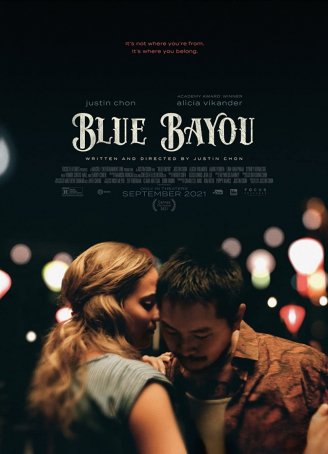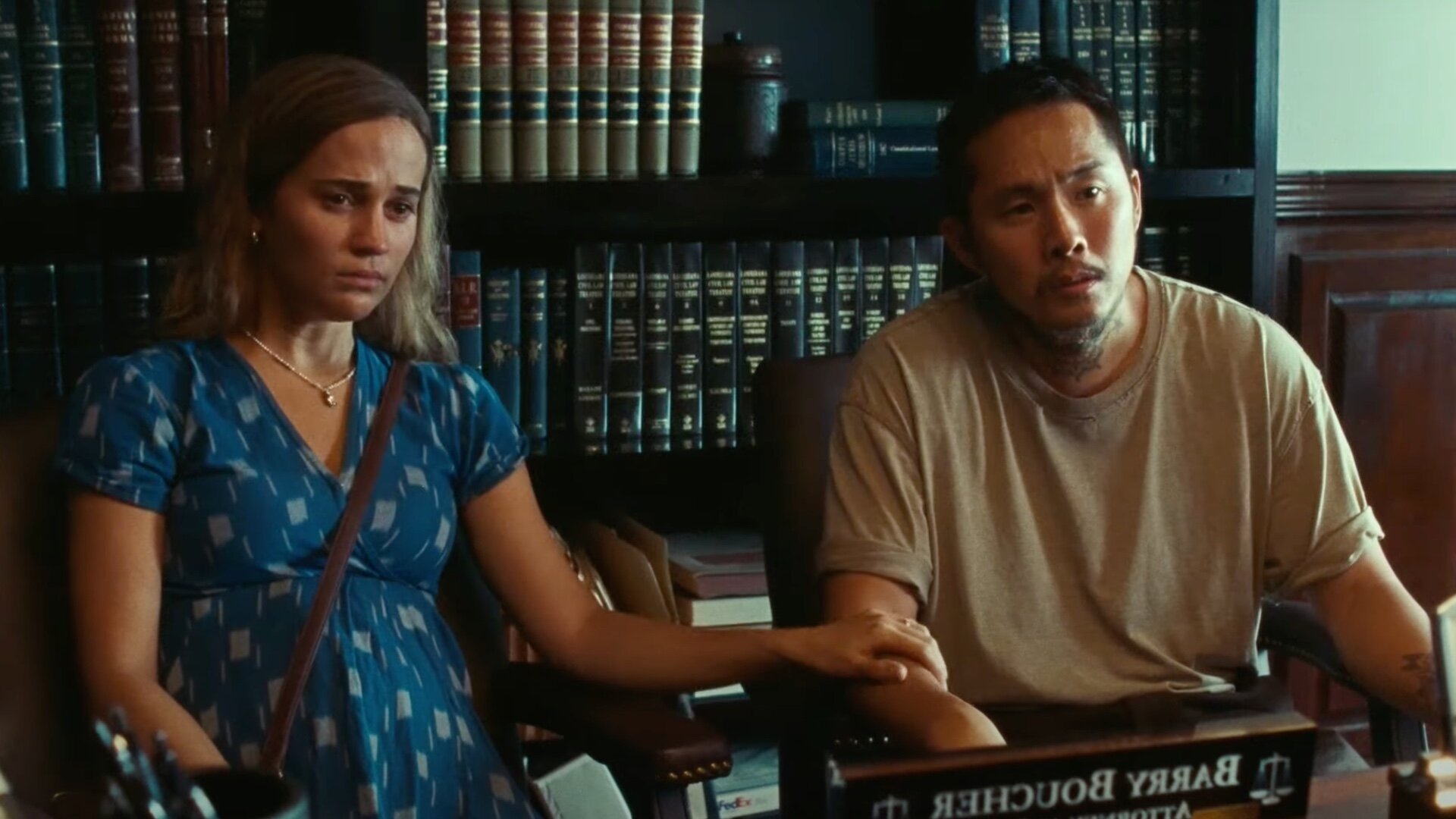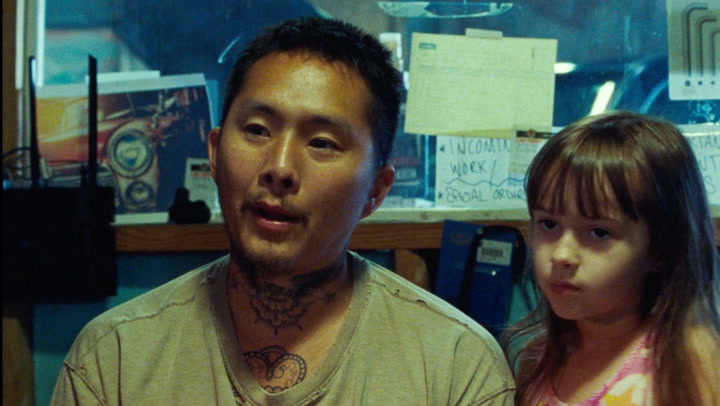Blue Bayou (United States/Canada, 2021)
September 15, 2021
U.S. immigration laws are filled with incongruities and loopholes. In Blue Bayou, writer/director/star Juston Chon addresses one of the least-known and most egregiously unfair: that a young child adopted from a foreign country, even if his/her parents are citizens, may be subject to deportation later in life if they were not properly processed after coming to the United States. In many cases, these children believe themselves to be citizens so, when ICE comes calling, the shock is understandable, especially since many have not been to their “home” country since they were infants.
Blue Bayou channels plenty of anger and passion and the narrative lynchpin is sufficiently compelling (despite a tendency toward melodramatic manipulation) but Chon’s capabilities as a writer don’t match those as a director and an actor. His portrayal of the lead character, Antonio, is strong and credible. His work behind the camera is noteworthy, especially the way he frames several key point-of-view shots and a number of postcard-perfect images of Louisiana that he and cinematographers Ante Cheng and Matthew Chuang capture. Unfortunately, the screenplay is an inconsistent and congested affair with too many subplots and a tendency for characters not to communicate in believable ways.
When we first meet Antonio, he’s desperately trying to find work. The cards are stacked against him, however – not only is he a non-white in a state where diversity isn’t necessarily a valued quality but he’s an ex-con. He needs the work because his (white) wife, Kathy (Alicia Vikander), is pregnant and it’s becoming increasingly difficult to pay the bills. The couple also has a little girl, Jessie (Sydney Kowalske), who views Antonio as her father; her biological dad, a local cop (Mark O’Brien), abandoned her after birth. Lately, however, he has indicated a desire to get to know her – something that doesn’t sit well with either Kathy or Antonio.
 Antonio’s real troubles start when he becomes
involved in an altercation with a racist cop. The brawl lands Antonio in jail
but, when Kathy arrives to bail him out, she is told that ICE has taken him.
His immigration status is in question because, despite being adopted as a baby
by U.S. citizens, his citizenship was never finalized. He is deemed to be in
the country illegally. He and Kathy hire a prominent immigration attorney
(Vondie Curtis-Hall), whose steep retainer forces Antonio to return to his
criminal ways to come up with the money. Meanwhile, Antonio befriends a
terminally ill Vietnamese woman, Parker (Linh Dan Pham), who is facing her
death with dignity.
Antonio’s real troubles start when he becomes
involved in an altercation with a racist cop. The brawl lands Antonio in jail
but, when Kathy arrives to bail him out, she is told that ICE has taken him.
His immigration status is in question because, despite being adopted as a baby
by U.S. citizens, his citizenship was never finalized. He is deemed to be in
the country illegally. He and Kathy hire a prominent immigration attorney
(Vondie Curtis-Hall), whose steep retainer forces Antonio to return to his
criminal ways to come up with the money. Meanwhile, Antonio befriends a
terminally ill Vietnamese woman, Parker (Linh Dan Pham), who is facing her
death with dignity.
Blue Bayou’s biggest misstep may be introducing the character of Parker into the mix. Despite a solid performance by Linh Dan Pham, the character isn’t well integrated into the overall story and at times provides a strange and unwarranted distraction from Antonio’s immigration struggles. The movie also features a racist character whose depiction is pure caricature. If presented with more nuance and subtlety, this character might have emphasized the level of bigotry that exists in segments of today’s society, but the over-the-top depiction is too broad to be taken seriously. Another misstep lies in Chon’s use of “movie moments” to impel the narrative forward. This is most evident during the climax, which features a series of clichés that exist solely in movies and bear only a passing resemblance to real life. Yes – this is one of those movies where someone is rushing through an airport to catch another person before they board a plane. Considering the unique circumstances, realism is quickly jettisoned in favor of melodrama. The trade-off permits an exchange that is equally likely to produce tears and eyerolls.
The lead performances are sterling. Alicia Vikander, whose Oscar-winning resume brings some “name power” to the production, transforms Kathy from a standard “stand by your man” type into a living, breathing individual whose love for her husband and children compels her to do things that, in ordinary circumstances, she might consider to be unthinkable. She also gets an opportunity to show off her singing chops with a surprisingly strong rendition of Linda Ronstadt’s “Blue Bayou.”
 Blue Bayou is a downer. Things aren’t looking good
for Antonio when the movie opens and they spiral downward from there. One could
argue that this is a love story at its core and I suppose that’s true – the
chemistry between Chon and Vikander is strong and their characters are
believably willing to sacrifice for each other (and their children) – but
whatever else it may be, this isn’t a happy love story. Even the
contrived ending feels like the glass is half-full.
Blue Bayou is a downer. Things aren’t looking good
for Antonio when the movie opens and they spiral downward from there. One could
argue that this is a love story at its core and I suppose that’s true – the
chemistry between Chon and Vikander is strong and their characters are
believably willing to sacrifice for each other (and their children) – but
whatever else it may be, this isn’t a happy love story. Even the
contrived ending feels like the glass is half-full.
Antonio’s situation is likely to provoke anger and sadness but the real tragedy is that, although Blue Bayou is fictional, the central injustice is based on real-life situations (as is illustrated during the closing credits). Chon’s screenplay may be too cluttered and inconsistently paced to work the way he intends but his movie, even as imperfect as it may be, highlights this problem and reminds us that until our politicians do their jobs and address immigration (regardless of what the end result is), there are going to be many more stories like this and few are going to conclude with happy endings.
Blue Bayou (United States/Canada, 2021)
Cast: Justin Chon, Alicia Vikander, Mark O’Brien, Linh Dan Pham, Vondie Curtis-Hall, Sydney Kowalske
Home Release Date: 2021-12-21
Screenplay: Justin Chon
Cinematography: Ante Cheng, Matthew Chuang
Music: Roger Suen
U.S. Distributor: Focus Features
U.S. Release Date: 2021-09-17
MPAA Rating: "R" (Profanity, Violence)
Genre: Drama
Subtitles: none
Theatrical Aspect Ratio: 1.66:1
- (There are no more better movies of Justin Chon)
- (There are no more worst movies of Justin Chon)
- Arrival (2016)
- Ready or Not (2019)
- (There are no more better movies of Mark O’Brien)
- Front Runner, The (2018)
- (There are no more worst movies of Mark O’Brien)

Comments